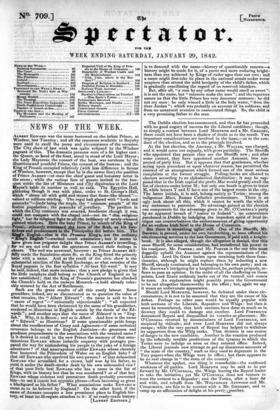NEWS OF THE WEEK.
ALBERT EDWARD was the name bestowed on the infant Prince, at Windsor, last Tuesday ; and all the resources available to Royalty
were used to swell the pomp and circumstance of the occasion. The City show of last week was quite eclipsed by the Windsor pageant of this. The dramatis personae were of a far higher cast : the Queen, as head of the feast, stood in stead of the Lord Mayor ;
the Lady Mayoress, the consort of the host, was outshone by the illustrious and youthful Prince, the consort of the hostess ; and the King of Prussia occupied relatively (with less difference in favour of Windsor, however, except that he is the newer lion) the position of Prince ALBERT—at once the chief guest and honorary actor in
the scene ; while the various lists of guests invited to the ban-
quet outdo the list of Ministers and City, dignitaries at the Lord Mayor's table in number as well as rank. The Egyptian Hall,
glittering though it was with plate, cedes to St. George's Hall, which " shone all with gold and stones that flame-like blazed "— valued at millions sterling. The regal hall glared with "lords and peacocks "—lords being the staple, the "common people" of the festive population ; the peacocks of jewellery. The pavilion in which the City ceremony was enacted, handsome though it was,
could not compare with the chapel and—not its " dim religious light," but its religious light in all the brilliancy of newly-cleaned painted windows. Here the baby Prince, by mouth of the King of Pruss;i solemnly renounced ,the lusts of the flesh, as his fore- fathers and predecessors in the Principality did before him. The King's English—that is the Prussian king's, not the ordinary "King's English "—excited much admiration ; but it seems to have given less poignant delight than Prince ALBERT'S trowelling, for we are not told that the spectators vented their feelings in cheers. The end was answered, however : as Prince ALBERT skil- fully made the foundation-stone fit, so the King fitted the princely babe with a name. And as the result of the civic show is the substantial erection of the Royal Exchange, so what remains of the Royal pageant is the four syllables " Al-bert Ed-ward." It may be said, indeed, that more remains; that a new pledge is given that the little neophyte shall belong to the Church of England as by law established ; that the King of Prussia's guarantee has clinched the Church's hold on the embryo Monarch—a hold already toler- ably secured by the Act of Settlement.
Such are the great results of all this costly labour. Some grumblers, indeed, are so discontented as to question the value of what remains, the "Albert Edward " : the name is said to be a "cause of regret "—" universally objectionable " : "all expected that he would have been christened by the name of his grandfather, rendered so illustrious in English annals by the deeds of the Ed- ward.s " and another says that the name of Edward is so "Eng- lish." "Why, it is Saxon ; and so is Albert. And how is the name of " Edward" so illustrious ? If some questionable pride hangs about the recollections of Crecy and Agincourt—if some technical reverence belongs to the English Justinian—do greatness and goodness preponderate in the associations with the vaunted name ? Is it desired to recall in the new Prince the memory of that sanc- timonious EDWARD whose imbecile coquetry with proteges pre- pared the way for surrendering his people to the yoke of a foreign adventurer ? of that unscrupulous soldier EDWARD whose cheatery first bestowed the Princedom of Wales on an English baby ? of that old EDWARD who survived his own powers ? of that debauched EDWARD who scrambled for a crown, half won by his father, to yield it under the death-stroke dealt by his own unbounded vice ? of that poor little brat EDWARD who has a name in the list of Kings, with no history but that he was smothered ? or of that boy EDWARD whose sickness and premature death probably prevented him—to use a coarse but apposite phrase—from becoming as great a blackguard as his father ? What associations make EDWARD a name so to be beloved by England? On the other hand, if the name of ALBERT occupies a less prominent place in English his- tory, at least no ill-repute attaches to it : if no ready-made history
is to descend with the name—history of questionable renown—a history might be made for it, of a purer and more enduring bright- ness than any achieved by Kings of ruder ages than our own; and a name might first take its place in the national annals under worse auspices than attend the mild benignity of the child's father, which is gradually conciliating the regard of us reserved islanders.
But, after all, "a rose by any other name would smell as sweet": it is not the name, but "manners make the man"; and the reporters assure us that the little Prince has very decorous manners : he did not cry once : he only winced a little at the holy water, "from the river Jordan"; which was probably on account of its coldness, and from no unnatural aversion to consecrated things. So, the child is a very promising father to the man.


























